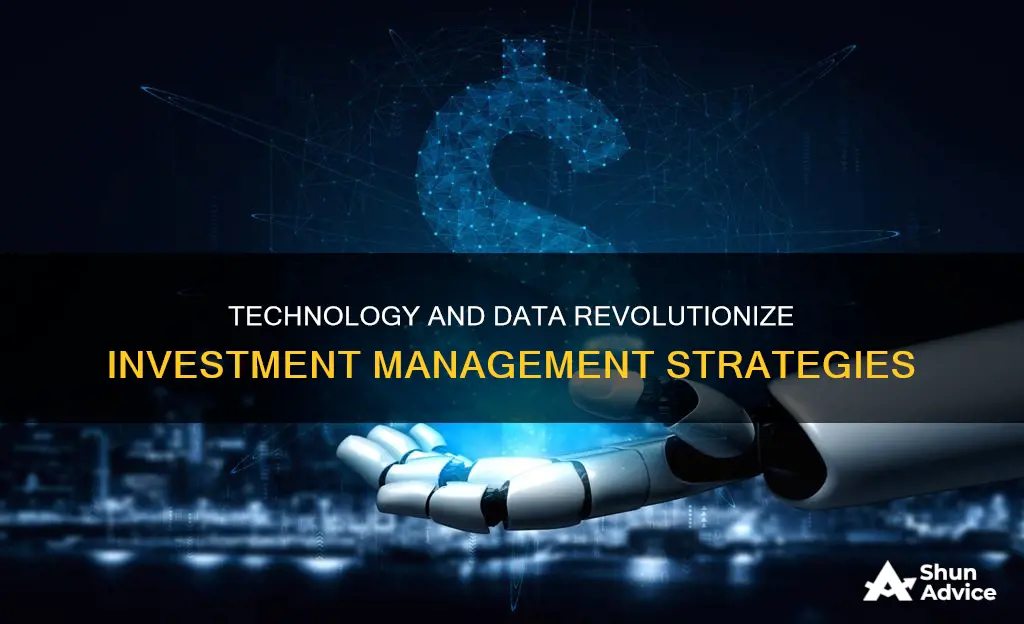
Technology and data are transforming the investment management industry, with artificial intelligence (AI) and machine learning playing pivotal roles in this shift. AI has the ability to automate data analysis, streamline workflow, and handle administrative tasks, leading to significant time savings and improved efficiency for investment professionals. This enables them to make more informed and quicker investment decisions, enhancing their portfolio optimisation and risk mitigation strategies. The COVID-19 pandemic has also accelerated the adoption of technology in the industry, as leaders navigate operational challenges and plan for the future. As a result, CEOs must embrace these advancements and set a clear vision for their organisations to stay competitive.
What You'll Learn

AI-driven insights for better decision-making
AI-driven insights are transforming the way investment managers make decisions, enhancing their speed, accuracy, and objectivity. By leveraging AI, investment managers can make data-backed decisions, reducing the reliance on gut feelings and subjective judgments.
AI algorithms can analyze a vast array of data sources, including financial statements, economic indicators, market trends, company reports, and historical data. This enables investment professionals to identify relevant information, patterns, and trends, thereby gaining a comprehensive understanding of the market. As a result, they can make well-informed decisions, capitalise on market inefficiencies, and identify potential investment opportunities and risks.
For instance, AI-driven portfolio analysis tools enable investment professionals to uncover hidden opportunities by analyzing market trends, historical performance, and company financials. This allows them to identify undervalued assets and emerging market trends, providing a competitive edge in the market.
Additionally, AI technology assists in portfolio optimisation by suggesting optimal asset allocations based on historical performance, risk tolerance, and investment objectives. This helps construct well-diversified portfolios that align with clients' investment goals and risk preferences, ultimately leading to better investment outcomes.
The use of AI in investment management also extends to automating routine administrative tasks. AI-powered chatbots, for example, can handle client inquiries and provide basic investment advice, allowing investment professionals to focus on more complex and strategic tasks.
Furthermore, AI enhances risk analysis by identifying hidden risks and monitoring real-time data. AI-driven risk analysis considers a wide range of data, including historical performance, market trends, and economic indicators, to provide comprehensive insights and identify potential risks and opportunities. By continuously monitoring market conditions, AI enables investment professionals to react quickly to changing market dynamics and make proactive decisions to mitigate risks.
In conclusion, AI-driven insights are revolutionising decision-making in investment management. By embracing this technology, investment professionals can improve their efficiency, accuracy, and ability to identify patterns, ultimately leading to more informed and profitable investment strategies.
Building an Early Investment Portfolio: A 20-Something's Guide
You may want to see also

Streamlined workflows and automation
AI technology plays a pivotal role in streamlining workflows and automation in investment management. With advanced algorithms and machine learning capabilities, AI systems can quickly analyse vast amounts of data, providing valuable insights much faster than human analysts. This enables investment professionals to automate time-consuming tasks and focus on more strategic activities. For example, AI can efficiently process and analyse financial data from various sources, such as market trends, company reports, and economic indicators, allowing for quicker and more informed investment decisions.
AI-powered chatbots are another example of automation in investment management. These chatbots can handle client inquiries and provide basic investment advice, freeing up time for investment professionals to focus on more complex tasks. Additionally, AI-driven portfolio analysis tools enable professionals to uncover hidden opportunities and make well-informed investment decisions by analysing vast amounts of data, including market trends, historical performance, and company financials.
The benefits of streamlined workflows and automation extend beyond time savings. AI-driven solutions enable investment managers to optimise asset allocation, uncover hidden opportunities, and improve risk management. By automating data collection and analysis, AI systems can gather and process data from various sources, helping investment managers stay up-to-date with market trends and make informed decisions. Furthermore, AI technology can identify patterns in historical data that may not be apparent to human analysts, leading to more accurate predictions about future trends and potential investment opportunities.
In conclusion, the integration of AI technology has revolutionised the investment management industry by streamlining workflows and enabling automation. It has enhanced efficiency, improved decision-making capabilities, and allowed investment professionals to focus on strategic activities, ultimately delivering superior results. As the industry continues to evolve, embracing AI integration will be crucial for investment professionals to stay ahead of the curve.
Understanding Portfolio Investment Partnerships: A Comprehensive Guide
You may want to see also

Data-driven transparency
Data analytics allows investors to identify market trends, uncover hidden investment opportunities, and assess the performance of their portfolios in real time. For example, AI-driven insights can help investment professionals make data-backed decisions and optimise their portfolios. AI can quickly analyse large volumes of data, including historical market data, to identify patterns and potential risks, enabling investors to react quickly to market changes.
Additionally, regulatory reporting and compliance are also improved by data and technology. Technology helps manage risk and compliance obligations, reducing manual intervention and potential errors. It also enables firms to meet increasing demands for transparency and reporting from investors, clients, and regulators.
The use of data and technology in investment management has been accelerated by the COVID-19 pandemic, which has increased the reliance on digital tools and data analysis. As a result, CEOs and industry leaders must embrace these advancements and set a clear vision for how to utilise them to gain a competitive advantage.
Overall, data-driven transparency, enabled by technology, is transforming the investment management industry by providing new insights, improving efficiency, and reducing risks for investors.
Ally Invest Trade Times in Managed Portfolios
You may want to see also

Accessibility and customisation
The integration of technology and data in investment management has improved accessibility and enabled customisation for investors. The use of technology, such as online trading platforms, has lowered barriers to entry and allowed investors of all experience levels to participate in the financial markets. These platforms provide easy ways to buy and sell stocks, bonds, and other assets. Additionally, robo-advisors offer personalised investment advice and portfolio management services, enabling individuals to build portfolios tailored to their needs.
The availability of data and advancements in technology have also increased customisation options for investors. Clients now expect instantaneous and accessible information, and firms must be able to deliver high-speed, accurate data to meet these expectations. Off-the-shelf products are no longer sufficient, and managers must develop the agility to customise products and services on demand without increasing operational cost and complexity.
Artificial intelligence (AI) has played a significant role in improving accessibility and customisation. AI-driven insights help investment professionals make data-backed decisions and optimise portfolios based on individual needs and goals. AI technology can analyse vast amounts of data, including market trends, company reports, and economic indicators, in a fraction of the time it would take a human analyst. This enables investment professionals to make quicker and more informed decisions.
The use of AI has also enhanced risk analysis by identifying hidden risks and monitoring real-time data. By integrating AI, investment professionals can utilise sophisticated algorithms to analyse portfolio risk more accurately and efficiently, taking into account historical performance, market trends, and economic indicators. This comprehensive analysis allows for a more accurate assessment of potential risks and their potential impact on investment portfolios.
In addition to improving risk analysis, AI technology assists in automating routine administrative tasks. For example, AI-powered chatbots can handle client inquiries and provide basic investment advice, freeing up time for investment professionals to focus on more complex and strategic tasks.
The benefits of AI in investment management extend beyond time savings and improved efficiency. AI-driven solutions enable investment managers to uncover hidden opportunities, optimise asset allocation, and mitigate risks more effectively. By leveraging AI, investment managers can gain a competitive edge in the market and deliver superior performance for their clients.
Investing Young: My Journey to 300k Before 30
You may want to see also

Regulatory compliance and risk management
In recent years, the investment management industry has witnessed an exponential growth in data, including client interactions, alternative data sets, and market information. This abundance of data has heightened the need for robust risk management and compliance obligations. Technology, particularly artificial intelligence (AI), plays a pivotal role in this regard. AI-powered solutions enable investment firms to efficiently mine and analyse vast datasets, identifying hidden risks and potential compliance issues. The ability to process and interpret large volumes of data enhances the accuracy and timeliness of risk management practices within investment firms.
Moreover, AI-driven insights aid investment professionals in making data-backed decisions, reducing the reliance on subjective judgment and improving the overall risk management framework. The integration of AI in portfolio risk analysis allows for the consideration of a wide range of factors, including historical performance, market trends, and economic indicators. This comprehensive approach enables investment managers to make more informed decisions, proactively mitigate risks, and protect their clients' investments.
Additionally, the use of AI in regulatory compliance and risk management brings about significant time savings. By automating data analysis and administrative tasks, investment professionals can focus their efforts on more strategic activities, such as research, strategy development, and client engagement. This shift in focus allows for a more proactive approach to risk management and regulatory compliance, ensuring that investment firms stay ahead of the curve and adapt to evolving market dynamics.
In conclusion, the integration of technology and data in regulatory compliance and risk management has been transformative for the investment management industry. By leveraging advanced analytics, automation, and AI-driven insights, investment firms can enhance their decision-making capabilities, streamline compliance processes, and improve overall risk management frameworks. As technology continues to evolve, investment firms must embrace these advancements to maintain their competitive edge and effectively navigate the complex landscape of regulatory requirements and risk management.
Argus Investment Management: Performance and Strategy Analysis
You may want to see also
Frequently asked questions
Data is transforming the investment management industry by improving efficiency and enabling more informed decision-making. With the help of advanced algorithms and machine learning, vast amounts of data can be quickly analysed, providing valuable insights that allow investment professionals to make strategic decisions and build portfolios tailored to their clients' needs.
Technology is transforming investment management by streamlining workflows, automating administrative tasks, and improving risk analysis. For example, AI-powered chatbots can handle client inquiries, while AI algorithms can monitor real-time market data to identify emerging risks and trends, enabling investment managers to make data-driven decisions and adjust their strategies accordingly.
The benefits of technology and data in investment management include improved efficiency, enhanced decision-making, increased accessibility, and reduced risk. Technology has made the financial markets more accessible to investors of all experience levels, allowing them to take control of their investments through online trading platforms and robo-advisors. Additionally, technology has enabled the emergence of new investment vehicles, such as cryptocurrencies and digital assets, providing investors with new opportunities to diversify their portfolios.







